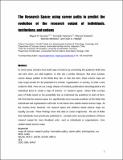The research space: using career paths to predict the evolution of the research output of individuals, institutions, and nations
Author(s)
Mendoza, Marcelo; Hidalgo, César A.; Guevara Albornoz, Miguel R; Hartmann, Dominik Hartmann; Aristaran, Manuel
Download11192_2016_2125_ReferencePDF.pdf (4.652Mb)
OPEN_ACCESS_POLICY
Open Access Policy
Creative Commons Attribution-Noncommercial-Share Alike
Terms of use
Metadata
Show full item recordAbstract
In recent years scholars have built maps of science by connecting the academic fields that cite each other, are cited together, or that cite a similar literature. But since scholars cannot always publish in the fields they cite, or that cite them, these science maps are only rough proxies for the potential of a scholar, organization, or country, to enter a new academic field. Here we use a large dataset of scholarly publications disambiguated at the individual level to create a map of science—or research space—where links connect pairs of fields based on the probability that an individual has published in both of them. We find that the research space is a significantly more accurate predictor of the fields that individuals and organizations will enter in the future than citation based science maps. At the country level, however, the research space and citations based science maps are equally accurate. These findings show that data on career trajectories—the set of fields that individuals have previously published in—provide more accurate predictors of future research output for more focalized units—such as individuals or organizations—than citation based science maps.
Date issued
2016-09Department
Massachusetts Institute of Technology. Media LaboratoryJournal
Scientometrics
Publisher
Springer Netherlands
Citation
Guevara, Miguel R. et al. “The Research Space: Using Career Paths to Predict the Evolution of the Research Output of Individuals, Institutions, and Nations.” Scientometrics 109.3 (2016): 1695–1709.
Version: Author's final manuscript
ISSN
0138-9130
1588-2861